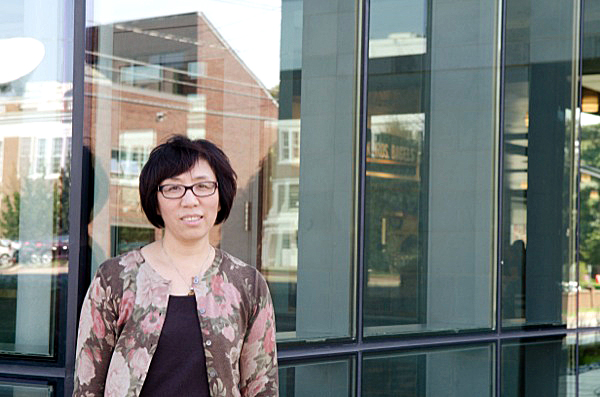
USDA grants
UD plant and soil sciences researcher receives two USDA grants
9:46 a.m., Oct. 7, 2013--The University of Delaware’s Yan Jin has received two awards from the U.S. Department of Agriculture for her studies on wetlands waters and for cross-disciplinary research on fresh produce and microbial contaminants.
The funding for both projects is being provided through the USDA National Institute of Food and Agriculture’s Agriculture and Food Initiative (AFRI) Competitive Grants Program.
Research Stories
Chronic wounds
Prof. Heck's legacy
Jin, professor of soil science and an environmental physicist in the Department of Plant and Soil Sciences in UD’s College of Agriculture and Natural Resources (CANR) said the four-year wetlands project is funded under AFRI’s Renewable Energy, Natural Resources and Environment program area and is titled “Colloid Mobilization and Biogeochemical Cycling of Organic Carbon, Nitrogen and Phosphorous in Wetlands.”
This is a new collaboration developed with Bruce Vasilas, UD professor of plant and soil sciences and a hydric soil scientist with extensive research experience in wetland hydrology and water chemistry.
The project design incorporates extensive sampling of both ground and surface waters at three wetland sites with complementary laboratory experiments.
Wetlands are vital components to the ecosystem because they can remove nutrients and pollutants before those can enter downstream waters. Jin’s research will ultimately focus on how the mobilization of colloidal particles within the soil can influence the transport, retention and cycling of essential nutrients such as nitrogen, phosphorus and dissolved organic matter.
A comprehensive assessment of wetlands and a clear understanding of their geochemical and hydrological mechanisms controlling nutrient retention/removal and carbon cycling is valuable in developing integrated management strategies of water resources at the urban-ecological interface.
Jin said she is very excited about the opportunity to team with Vasilas, who is a nationally recognized expert on wetlands and has well-established field sites for which long-term monitoring data of hydrological, water chemistry and soil properties are already available.
She is confident that their work will generate a better understanding of the role colloids might play in natural wetlands in the cycling of essential nutrients and carbon.
“We are a nice match in terms of us having very different skills. My expertise is in the lab while his is in the field,” said Jin. “By working together and combining field measurements and laboratory investigations we will understand things each one of us individually could not understand as well.”
Produce research
The second grant, awarded by AFRI’s Food Safety, Nutrition, and Health Program, evaluates the processes contributing to the microbial contamination of fresh produce. “Receiving this award is very encouraging, and a bit surprising because this is the first time we applied and we are being funded by a program that is outside of our discipline. The project is a new cross-discipline attempt to link environmental physics to the field of food safety,” Jin said.
With the increasing association of food-borne illness outbreaks with fruits and vegetables, the mechanisms allowing pathogens to attach and colonize on these surfaces has come into question. The goal of the project will be to link crop surface properties, physics of small-scale water organization and subsequent nutrient availability with the attachment, growth and colonization of bacteria.
The three-year project will be a joint effort with two young scientists, Volha Lazouskaya, a former Ph.D. student and postdoctoral researcher in Jin’s group, and Gang Wang, who will join Jin’s group early next year from the Swiss Federal Institute of Technology.
John Xiao, professor of physics in UD’s Department of Physics and Astronomy, and Kali Kniel, professor of food microbiology in CANR’s Department of Animal and Food Sciences, will also participate in the project. The goal of this research is to provide insight to improve risk assessment methods and pathogen control protocols of produce contamination.
Jin’s work takes a systematic approach and applies physics and colloidal theories. “In this project, we will apply our knowledge of colloid/bacteria attachment and transport processes in porous media to understand how microbial pathogens attach and colonize to fruit and vegetable surfaces,” she said. “We will use natural produce surfaces and create model surfaces using state-of-the-art nanofabrication techniques to mimic surface features such as roughness, hydrophobicity and water distribution, which affects bacterial attachment, colonization and growth.
“We will compare those properties across different produces to evaluate their vulnerability to pathogenic contamination. We also expect to develop a computational model, which will provide a quantitative and predictive tool for addressing the key biophysical factors influencing bacterial attachment, survival and colonization on fresh produce.”
Although Jin’s office is currently located in Townsend Hall, she soon will be making the move to UD’s new Interdisciplinary Science and Engineering Laboratory (ISE Lab), where she will utilize state of the art technologies during her projects.
Research group
The Jin group’s general research interest is in measurement, modeling and interpretation of mass and energy flow and transformation in soil and groundwater. A special focus in the last decade has been on the behavior of colloids, microscopic particles that include natural soil mineral and organic particles, manufactured nanoparticles, and biocolloids or viruses and bacteria.
The basic and systematic nature of their investigation on the mechanisms of colloid mobilization, attachment, and transport from their previous research built a strong foundation that led to the award of the two new NIFA grants. The new projects will allow Jin’s group and their collaborators to apply their fundamental knowledge of colloid behavior to address larger scale environmental issues and to new systems they had never worked with before.
Article by Angela Carcione
Photo by Danielle Quigley








